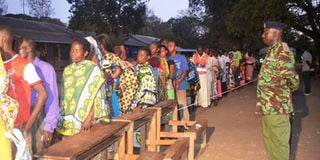What IEBC is doing to deliver credible election and why new laws need review

Residents of Ganda in Kilifi queue to vote at Maziwani Primary School in the Malindi parliamentary by-election on March 7, 2016. PHOTO | KAZUNGU SAMUEL | NATION MEDIA GROUP
What you need to know:
There has been consensus that there are indeed issues that we must address as we move forward.
Even then, the Commission is planning for a August 8, 2017 General Election.
We cannot afford to second-guess our efforts despite some of the hiccups. We have a duty to the people of this country to ensure there is progress towards a successful election.
And, as we move forward, we invite stakeholders to stand with us.
We all want to look back after the August 8, 2017 election and say, this is the kind of election we have always desired. That is my vision and that of my team.
But how do we get there? We started off by defining the election programme whose implementation began in earnest in January. In July, Parliament appropriated over Sh18 billion to allow the Commission upscale its activities towards a credible election. We have made tremendous progress in realising our plans.
Then there are those programmes that have delayed after the enactment of the Electoral Laws (Amendment) Act 2016. They include revamping electoral technology, inspection of the register of voters and second phase of mass voter registration. Deliberate measures have been put in place to ensure that the changes do not affect the overall plan for the election.
Nonetheless, the Commission also raised some fundamental issues with regard to the new law. Take, for instance, the process leading to acquisition of integrated electoral technology. We have christened the new system: the Kenya Integrated Election Management Systems.
While we are pleased with the progress in designing specifications of the election management systems, we have concerns over procurement timelines provided by the new law. As per the new law, the election management systems should be in place by December 8.
Those who recall the BVR/EVID procurement in 2012 will bear with us when we emphasise the need for compliance and transparency in the acquisition of high-value items such as election management systems. However, the Public Procurement and Assets Disposal Act, 2015 has timelines that make it almost impossible to procure and put in place the new system by December 8.
NOT CONSISTENT
In a nutshell, the procurement timelines provided for in the new election law and the law governing procurement are not consistent and should therefore be revisited. Meanwhile, the Commission is proceeding on the understanding that the equipment will be received, tested and deployed in good time before the election. Our projection for delivery of the election management systems is now February 2017 if the process is smooth.
With respect to the 2017 General Election register of voters, the Commission will open the register for verification of voters using biometric kits from April 10 – May 10, 2017. All registration must, therefore, close by end of February 2017. This is the reason why the Commission secretariat will remain focused on preparing for mass voter registration between now and February. Political players must also direct their energies to continuously mobilising eligible citizens to register as voters.
On party primaries, many Kenyans have been asking whether the Commission is best placed to carry out party primaries as per the new election law. For all intents and purposes, the Commission can offer its expertise in conducting party primaries. However, like all elections, party primaries must meet minimum democratic standards. Whether involved directly or indirectly, the Commission has a constitutional mandate to regulate party nominations.
WILL COMMIT
The Commission is developing guidelines for party nominations and we expect that parties will commit to comply. Key considerations include: Deadline for submission of requests, valid party membership list (register), mode of election, rules on intra-party dispute resolution, number and location of polling centres, seats being contested, budgetary projections and funding, among others. Political parties must remember that the register of voters prepared by IEBC cannot be used as a party’s membership list.
Further, under the new law, both party primaries and the nomination of candidates must end by June 9, 2017. Due to potential overlaps, we are of the view that political parties carry out their primaries much earlier. For instance, the Commission may require political parties to carry out party primaries 90 days before the election in order to allow for sufficient time to address disputes arising from party primaries; an aspect that was missed out when the new law was passed.
In the last one month, the Commission met with political parties, civil society organisations, the media, development partners, and the Justice Legal Affairs Committee of the National Assembly to deliberate on the implications of the new law on election operations.
There has been consensus that there are indeed issues that we must address as we move forward.
Even then, the Commission is planning for a August 8, 2017 General Election. We cannot afford to second-guess our efforts despite some of the hiccups. We have a duty to the people of this country to ensure there is progress towards a successful election. And, as we move forward, we invite stakeholders to stand with us.
Ezra Chiloba is commissions secretary and chief executive officer, Independent Electoral and Boundaries Commission.




